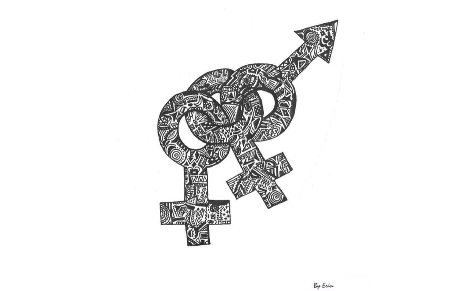 Bisexuality is a bit of a fraught subject. Bisexual people have to deal with stigma that simultaneously comes from inside and outside of the queer community. While being subjected to the same run-of-the-mill homophobia that gay and lesbian people face, bisexual people often experience biphobia coming from within the LGBTQ+ community for not being “gay enough.” Consequently, bi lives and stories are often obscured or omitted in queer politics, art, and culture. Another reason that bisexual people are under-represented is that their activism is often done in service to the wider LGBTQ+ activist agenda. For example, a bisexual trans activist’s sexuality might be obscured by the fact that most of their activism is focused on trans issues. Because bisexual people struggle for representation, bisexuality must be affirmed and celebrated as the integral part of our community that it is. Here are a few items in The ArQuives’s collections that demonstrate the stigma, difficulty, and joy of being bi, as told by bi people themselves: The Fence – A zine by Cheryl Dobinson
Bisexuality is a bit of a fraught subject. Bisexual people have to deal with stigma that simultaneously comes from inside and outside of the queer community. While being subjected to the same run-of-the-mill homophobia that gay and lesbian people face, bisexual people often experience biphobia coming from within the LGBTQ+ community for not being “gay enough.” Consequently, bi lives and stories are often obscured or omitted in queer politics, art, and culture. Another reason that bisexual people are under-represented is that their activism is often done in service to the wider LGBTQ+ activist agenda. For example, a bisexual trans activist’s sexuality might be obscured by the fact that most of their activism is focused on trans issues. Because bisexual people struggle for representation, bisexuality must be affirmed and celebrated as the integral part of our community that it is. Here are a few items in The ArQuives’s collections that demonstrate the stigma, difficulty, and joy of being bi, as told by bi people themselves: The Fence – A zine by Cheryl Dobinson 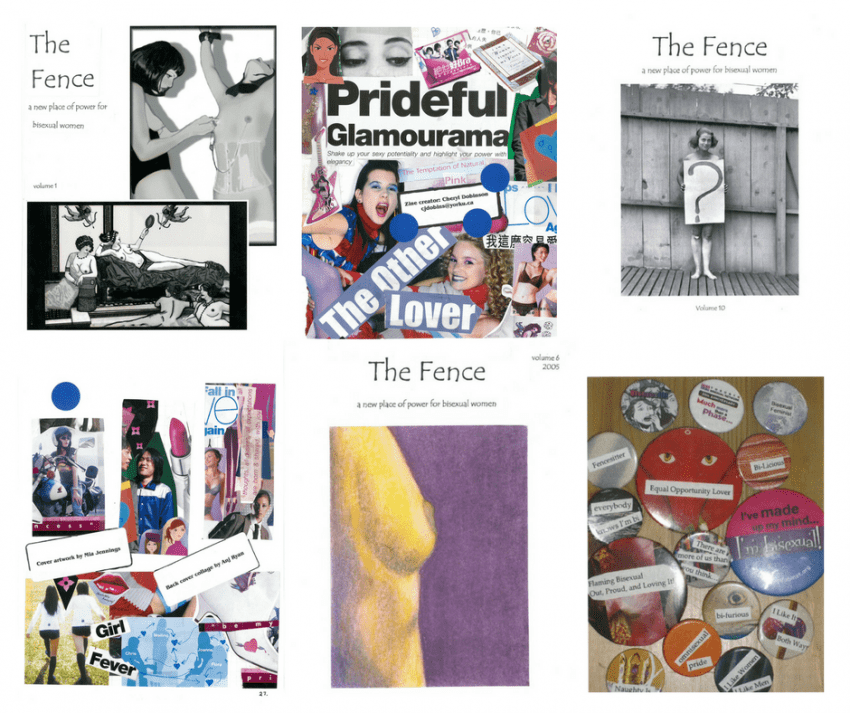 The Fence is a ten-volume zine for bisexual women which was produced from 2002 to 2010. The zine’s mission statement is as follows: “Calling bisexuals ‘fence sitters’ has been a way of marginalizing us, of placing us outside gay/lesbian and straight cultures by saying that we haven’t made a decision about our sexuality. ‘The Fence” is all about bisexual women reclaiming this position and speaking from our unique viewpoints that traverse straight and gay/lesbian cultures, but also allow us to have spaces of our own. ‘The Fence’ can be a positive and powerful place, and this zine is for the women who have decided to stay there!!” The Fence contains everything from poetry, Q & A’s, rants, personal narratives, and event transcripts to visual art and erotica. Look Both Ways – A book by Jennifer Baumgardner
The Fence is a ten-volume zine for bisexual women which was produced from 2002 to 2010. The zine’s mission statement is as follows: “Calling bisexuals ‘fence sitters’ has been a way of marginalizing us, of placing us outside gay/lesbian and straight cultures by saying that we haven’t made a decision about our sexuality. ‘The Fence” is all about bisexual women reclaiming this position and speaking from our unique viewpoints that traverse straight and gay/lesbian cultures, but also allow us to have spaces of our own. ‘The Fence’ can be a positive and powerful place, and this zine is for the women who have decided to stay there!!” The Fence contains everything from poetry, Q & A’s, rants, personal narratives, and event transcripts to visual art and erotica. Look Both Ways – A book by Jennifer Baumgardner 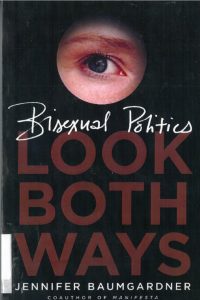 Look Both ways is a book about bisexual women and all the tensions that come along with being a bisexual woman and a feminist. The book’s blurb describes it as “Part memoir, part pop-culture study, Look Both Ways connects the prominent dots of a bisexual community […] that Baumgardner argues have bridged feminist aims with those of the gay rights movement.” The book explores cultural phenomena like the explosion of Ani DiFranco’s popularity and the sexual liberation and legitimisation of bisexuality that went along with it, as well as exploring the contested ground between lesbian and straight feminist politics that bisexual women inhabit. {rec•og•nize}: the voices of bisexual men – An anthology edited by Robyn Ochs and H. Sharif Williams
Look Both ways is a book about bisexual women and all the tensions that come along with being a bisexual woman and a feminist. The book’s blurb describes it as “Part memoir, part pop-culture study, Look Both Ways connects the prominent dots of a bisexual community […] that Baumgardner argues have bridged feminist aims with those of the gay rights movement.” The book explores cultural phenomena like the explosion of Ani DiFranco’s popularity and the sexual liberation and legitimisation of bisexuality that went along with it, as well as exploring the contested ground between lesbian and straight feminist politics that bisexual women inhabit. {rec•og•nize}: the voices of bisexual men – An anthology edited by Robyn Ochs and H. Sharif Williams 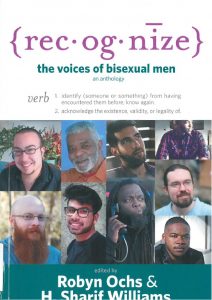 This anthology is made up of contributions from an unprecedentedly diverse group of bisexual men sharing stories about their lived experiences. Their narratives touch on a broad range of subjects including spirituality, bodies and embodiment, the problems of being labelled, and families and relationships. The contributions in this anthology thoroughly detail the way that sexuality, and specifically the fraught territory of bisexuality, interact with other social realities such as race, class, notions of ideal masculinity, and religion. Getting Bi: Voices of Bisexuals Around the World – And anthology edited by Robyn Ochs and Sarah E. Rowley
This anthology is made up of contributions from an unprecedentedly diverse group of bisexual men sharing stories about their lived experiences. Their narratives touch on a broad range of subjects including spirituality, bodies and embodiment, the problems of being labelled, and families and relationships. The contributions in this anthology thoroughly detail the way that sexuality, and specifically the fraught territory of bisexuality, interact with other social realities such as race, class, notions of ideal masculinity, and religion. Getting Bi: Voices of Bisexuals Around the World – And anthology edited by Robyn Ochs and Sarah E. Rowley 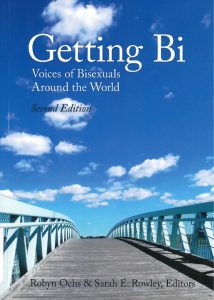 Another anthology co-edited by Robyn Ochs, this book contains contributions from bisexual people of all genders, all over the world, including a selection of translated essays. Where {rec•og•nize} provides a focused picture of the lives and experiences of bisexual men, Getting Bi is a project of unrestricted, global representation. The political importance of such a project is highlighted in the book’s introduction: “The increasingly interconnected world, linked by technology, economics, immigration and cultural exchange, has also made our communities more transnational. This global exchange of ideas, information and strategies enriches and complicates all of our activist movements.” Pamphlets and other ephemera
Another anthology co-edited by Robyn Ochs, this book contains contributions from bisexual people of all genders, all over the world, including a selection of translated essays. Where {rec•og•nize} provides a focused picture of the lives and experiences of bisexual men, Getting Bi is a project of unrestricted, global representation. The political importance of such a project is highlighted in the book’s introduction: “The increasingly interconnected world, linked by technology, economics, immigration and cultural exchange, has also made our communities more transnational. This global exchange of ideas, information and strategies enriches and complicates all of our activist movements.” Pamphlets and other ephemera 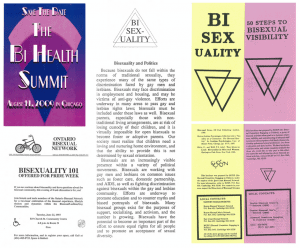 The ArQuives has a vast collection of pamphlets and other small texts that illuminate the history of LGBTQ+ social and political organising over the years. These pamphlets, published and distributed by various bisexual organisations in Canada and the United States, show how these organisations have facilitated educational, social, and health initiatives specifically for bisexual people. Author: Ben Charlton, volunteer Although the James Fraser Library book collection and Vertical Files (pamphlets and other ephemera) are held onsite at 34 Isabella Avenue in Toronto, please be aware that the Zines and many other collections are held offsite and an appointment is required to retrieve them. To make an appointment, please email queeries@arquives.ca
The ArQuives has a vast collection of pamphlets and other small texts that illuminate the history of LGBTQ+ social and political organising over the years. These pamphlets, published and distributed by various bisexual organisations in Canada and the United States, show how these organisations have facilitated educational, social, and health initiatives specifically for bisexual people. Author: Ben Charlton, volunteer Although the James Fraser Library book collection and Vertical Files (pamphlets and other ephemera) are held onsite at 34 Isabella Avenue in Toronto, please be aware that the Zines and many other collections are held offsite and an appointment is required to retrieve them. To make an appointment, please email queeries@arquives.ca
